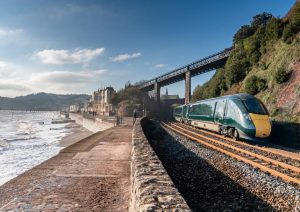 Hitachi Rail and Eversholt Rail signed an exclusive agreement for the development of an intercity battery hybrid train for Great Western Railway. The trial will demonstrate that the innovation meets passenger service and safety standards.
Hitachi Rail and Eversholt Rail signed an exclusive agreement for the development of an intercity battery hybrid train for Great Western Railway. The trial will demonstrate that the innovation meets passenger service and safety standards.
The two companies plan to install batteries on a modern Intercity Express Train to replace a diesel engine as a power source on an existing Hitachi-built five-car train, currently known as a bi-mode for its ability to switch seamlessly between electric and diesel power.
Adding a battery creates an electric-diesel-battery hybrid train (tri-mode) that will reduce fuel usage and carbon emissions by more than 20%.
Hitachi Rail will draw upon market-leading expertise in Japan, and the support of its battery partner Hyperdrive Innovation. The two North East-based companies reached an agreement in July 2020 to create and develop battery packs for mass production at Hyperdrive’s Hyve facility in Sunderland, the UK’s first independent battery pack manufacturing facility.
The projected improvements in battery technology, particularly in power output and charge, create opportunities to replace incrementally more diesel engines on long distance trains. The ambition is to create a fully electric-battery intercity train, to reduce the impact on the environment which is in line with UK’s 2050 net zero emissions target.
“This is an exciting partnership to develop technology that can make rail travel more sustainable across the UK’s network. Battery powered trains will support us in our battle against climate change and poor air quality and improve the overall passenger experience. As we continue to build back better, developments like this are major stepping stones towards achieving the UK’s 2050 net-zero emissions target,” Rail Minister, Chris Heaton Harris, said.
The battery hybrid train project investigates the conversion of Eversholt Rail’s Class 802 fleet to tri-mode. By using only battery power to travel in and out of stations and urban areas, the trains will improve air quality and dramatically reduce noise levels, creating a more pleasant environment for passengers and people living nearby.
GWR’s Intercity Express Train fleet currently call at 15 non-electrified stations on its journey between Penzance and London, all of which could benefit from trains running on battery-only power. The line between the South West and London is only partially electrified, with the majority of the 300-mile (480 km) journey requiring diesel power.
The fast train fleet is manufactured by Hitachi and owned by Eversholt Rail. They entered into transport services in August 2018.
Share on:



